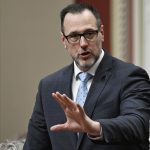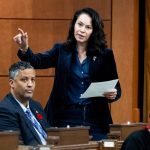Alberta Premier Danielle Smith says the fact that the federal government is not ruling out cutting energy exports as part of its response to the U.S. president-elect’s looming tariffs is ill-advised and infringes on provincial jurisdiction.
Smith made these comments during a virtual press conference with reporters on Jan. 13, when asked about Foreign Affairs Minister Mélanie Joly’s comments the day before that Canada’s response to the 25 percent U.S. tariff threat could include cutting off energy exports to the United States. Smith said oil and gas resources are owned by the provinces, and that her province will not stand for the measure.
“I would encourage the ministers to … understand how our integrated pipeline system works,” Smith said, noting that cutting one of the pipelines to the United States would cut power to Quebec and Ontario.
“[We have to] start looking at ways that we would be able to practically respond, because there’s no point in making empty threats that cannot be executed on,” Smith said.
The premier added that, if Canada’s response went down that path, the federal government would “have a national unity crisis on their hands, at the same time as having a crisis with our U.S. trade partners.”
Smith said she cannot predict how residents of her province would react in that scenario, but said the idea of “Eastern politicians”—whom she says have been “hostile” to Alberta’s interests—using oil and gas as “a point of leverage” in tariff talks would be “very irritating, not only to me, but also to fellow Albertans.”
Smith’s address to the media came after her weekend visit to U.S. President-elect Donald Trump at his Mar-a-Lago resort in Florida on Jan. 11, as well as at his golf club the following day. Smith said she went to Florida at the invitation of Canadian entrepreneur and “Shark Tank” investor Kevin O’Leary.
Smith said she had a “friendly and constructive conversation” with the incoming president, making the case for Canada and, in particular, for her province as a major energy supplier for the United States.
During a Jan. 13 press conference, Ontario Premier Doug Ford said he was glad Smith met with Trump, and that it showed how “all the premiers are working hard.” When asked whether Smith’s public rejection of retaliation would affect Canada’s negotiating position, Ford said, “She’s speaking for Alberta. She’s not speaking for the country.”
During her address earlier in the day, Smith said her goal of discussing energy exports in Florida was to illustrate the importance of tariff-free trade, using one of Canada’s key exports to the United States as a case in point.
“I’m looking at using our energy relationship in a different way than I’m hearing other Canadian leaders talk about it,” she said. “I’m talking about using the basis of our strong energy relationship as the reason why we shouldn’t have tariffs on any of our Canadian products.”
Trump has threatened to slap a 25 percent tariff on all imports coming from Canada unless Ottawa addresses the flow of illegal immigration and drugs at the border.
On Dec. 12, 2024, the Alberta government introduced a $29 million border plan to improve provincial security and strengthen ties with the United States. Other premiers have also taken measures to avoid the tariffs, such as sending trade delegations to the United States, increasing surveillance at their borders, or considering retaliatory tariffs.
Ottawa on Dec. 17 launched a $1.3 billion strategy to secure the border against illegal immigration and drugs.
Smith has said she will attend Trump’s inauguration in Washington, D.C., on Jan. 20.
No Sign of Backing Down From Threats
Smith said that while meeting with Trump, she saw no signs that the president-elect was reconsidering his stance on imposing tariffs on Canada.
“I think we have to be prepared for what that’s going to look like,” Smith said. “And remember, any kind of retaliation that we do on tariffs hurts Canadians.”
She added she did not expect Trump to make tariff exemptions for oil and gas imports, and that her province will continue to work on stressing the importance of mutual cooperation. She said that, if the tariffs are imposed, there “will have to be” a Canadian response.
“We have to wait and see what he does, and then we have to have a measured and mature response to it that hopefully does not damage the relationship or damage Canadian consumers and Canadian businesses too much,” Smith said.
Despite the uncertainty, Smith said she saw interest from the incoming president in buying more oil and gas from Canada. “I was encouraged that there does seem to be an understanding on the part of the president about how we might be able to get more oil and gas to the United States,” she said.
“I think there’s some common ground to start from, once the new administration comes in, and that’s part of the reason why I’m building the relationships that I am.”
Canada’s premiers will meet with Prime Minister Justin Trudeau on Jan. 15 to discuss the country’s response to the tariff threat. Retaliatory tariffs are among the possible measures the first ministers will talk about.
A group of premiers will travel to Washington, D.C., on Feb. 12 to meet with U.S. officials and discuss trade.












